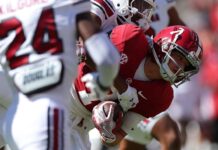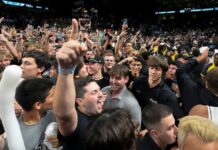[ad_1]
Georgia schools have legal cover to immediately begin paying their athletes directly, according to an executive order signed by the state’s governor Tuesday morning.
Gov. Brian Kemp signed an order that prohibits the NCAA or athletic conference from punishing any Georgia university or college “for compensating, or compensating, an intercollegiate student-athlete for such student-athlete’s NIL use.”
NCAA rules currently prohibit schools from directly paying athletes for the right to use names, images and likenesses. The association agreed to lift its restrictions on schools paying for NIL contracts as part of a pending antitrust settlement, but that deal has not been finalized. If the settlement is approved in its current form, those new rules are expected to go into effect at the start of the next academic year. Georgia’s order is effective immediately
Georgia’s order is similar to a law passed by the Virginia Legislature in July, which protected schools in that state from paying their athletes directly through NIL contracts without incurring NCAA fines.
The athletic directors at Virginia and Virginia Tech declined to share any plans to pay athletes directly when the bill was signed and have not made any public announcements about taking advantage of the ability to pay players since the law took effect July 1.
Sources told ESPN that neither Georgia nor Georgia Tech — the state’s two power conference schools — plan to start paying their players immediately. Instead, the executive order gives them the option to pay players if other schools around the country begin doing so.
“We extend our sincere gratitude to Governor Brian Kemp for his leadership today,” Georgia Athletic Director Josh Brooks and Georgia Tech Athletic Director Jay Batt said in a shared statement to ESPN on Tuesday. “In the absence of nationwide name, image and likeness regulations, this executive order provides our institutions with the necessary tools to fully support our student-athletes in their pursuit of NIL opportunities, remain competitive with our peers, and ensure the long-term success of our athletics program.”
The NCAA did not immediately respond to a request for comment.
Other states have considered legislation to help their schools facilitate paying players. For example, Missouri has a law that allows schools to direct money to third parties, which results in athletes being paid to appear in school marketing materials.
The pending antitrust settlement, if approved, would also limit the amount of money U.S. schools can pay directly to athletes. The cap will be slightly more than $20 million in the first year and is expected to increase annually.
Under their current law, schools in Virginia and Georgia can begin paying athletes immediately with no limit on the amount they can pay. If they do, the NCAA will have to challenge the new executive order in court to stop them.
[ad_2]













